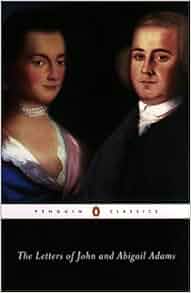

Covering key moments in American history - the Continental Congress, the drafting of the Declaration of Independence, the Revolutionary War, and John Adams's diplomatic missions to Europe - the letters reveal the concerns of a couple living during a period of explosive change, from smallpox and British warships to raising children, paying taxes, the state of women, and the emerging concepts of American democracy.įor more than seventy years, Penguin has been the leading publisher of classic literature in the English-speaking world. The Letters of John and Abigail Adams provides an insightful record of American life before, during, and after the Revolution the letters also reveal the intellectually and emotionally fulfilling relationship between John and Abigail that lasted fifty-four years and withstood historical upheavals, long periods apart, and personal tragedies. (Portia, Adams’ nickname for his wife was likely a reference to the intelligent and devoted heroine of Shakespeare’s The Merchant of Venice.The correspondence of a Founding Father and his brilliant wife She wrote that she awaited greater patriotism, greater prosperity and future correspondence from her beloved husband to his devoted Portia. In the letters John received, which Abigail had written in February, she bemoaned not only the difficulty of correspondence during war, but also of the lack of military fervor demonstrated by the New Englanders around her. They are a kind of neutral Tribe, or the Race of the insipids." From these neither good is to be expected nor Evil to be apprehended. More than one half the Inhabitants have removed to the Country, as it was their Wisdom to do-the Remainder are chiefly Quakers as dull as Beetles. "This City is a dull Place, in Comparason of what it was. In the second letter John drafted to Abigail on March 7, he declared that Philadelphia had lost its vibrancy during Congress’ removal to Baltimore.


Their mutual respect and adoration served as evidence that even in an age when women were unable to vote, there were nonetheless marriages in which wives and husbands were true intellectual and emotional equals. The remarkable correspondence between Abigail and John Adams-numbering 1,160 letters in total-covered topics ranging from politics and military strategy to household economy and family health. He is with Congress in Philadelphia, while she maintains their farm in Braintree, Massachusetts. On March 7, 1777, Continental Congressman John Adams writes three letters to and receives two letters from his wife, Abigail.


 0 kommentar(er)
0 kommentar(er)
